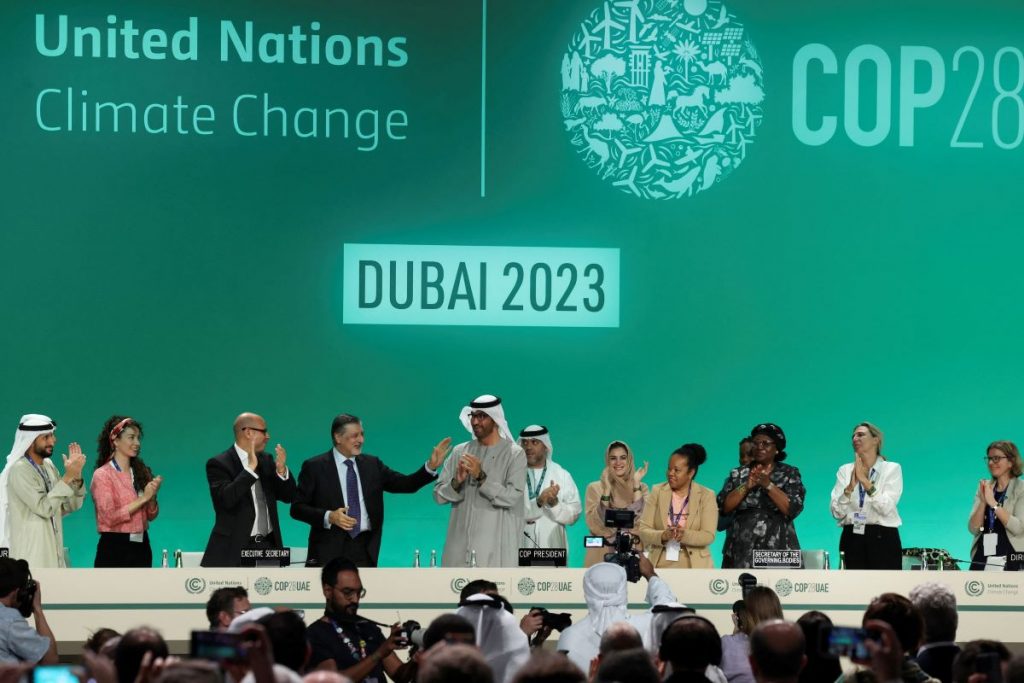このページを 日本語 で読む
COP28, the 28th Conference of the Parties to the United Nations Framework Convention on Climate Change, was held in late 2023. With near certainty that 2023 will have the highest temperatures in recorded history, interest in addressing the issue of global warming only continues to rise.
Like a World Expo
COP28 had over 70,000 registered participants. When I first participated in the negotiation process nearly 15 years ago, COPs were mainly viewed as a forum for intergovernmental negotiations. I never imagined back then that COPs would come to involve such a diverse range of stakeholders.
The venue for COP28 was Dubai, United Arab Emirates, the site of the 2020 World Expo. In fact, the multitude of pavilions and exhibits was much like the World Expo. The sight of local elementary school students touring the exhibits was charming. And for the first time, there was dedicated exhibition space for startups, a significant achievement. Ten companies from Japan participated, attracting high interest.
However, do we really need to hold an event on this scale every year? Gathering tens of thousands of people in a city in the desert to discuss the environment in air-conditioned venues felt quite surreal. I do not doubt others share my sentiment.
Is Media Coverage of Japan Fair?
Again at COP28, environmental NGOs presented Japan with the 'Fossil of the Day' award, which was widely covered in the media. The 'award' is handed out by young activists from NGOs who make daily event-style announcements from a corner of the venue throughout the two-week conference.
While their voices should not be disregarded, their criteria for selection are not clearly defined. Their premise is that developed countries bear responsibility for climate change. Given that many environmental NGOs are backed by Europeans, it seems customary that the US, Australia, Canada, and Japan are singled out for the award.
But is Japan really lagging behind on climate change countermeasures? In fact, among G7 nations, only Japan and the UK are on track to reach emission reduction goals.
The main agenda at COP28 was to review the progress made by each country on the Paris Agreement, a process known as the Global Stocktake. In this regard, Japan had a lot to be proud of.
Nevertheless, media coverage on energy and the environment in Japan is abnormally self-deprecating, often accepting criticism from international environmental NGOs without question.
While this author believes that there is still much for our country to do, a fair assessment of what has been achieved is necessary. Otherwise, it becomes difficult to clearly identify what remains to be done.
The Global Stocktake is essentially a report card on each country's efforts and has been under preparation for over two years. The focus of the negotiations has been on the language used in the synthesis report.
Battle over 'Phasing Out'
The major point of contention at COP28 was whether to include the phrase 'phasing out' when referring to fossil fuels in the conference's outcomes.
In the end, the term 'transition away' was used. This softer wording, along with an explicit statement on the necessary role of fossil fuels in energy security during the transition period, made the document acceptable for emerging and oil-producing countries. On the other hand, a clear policy on reducing the use of all fossil fuels, not just coal, allowed Western countries to also agree on wording expected to accelerate actions in the so-called Decisive Decade.
Targets such as tripling the global capacity of renewable energy by 2030 and doubling the average energy efficiency improvement rate were also outlined. As these are global goals, they did not face any strong opposition.
The significant difference from previous COP outcome documents lies in accelerating a diverse range of carbon-reducing technologies. These include nuclear power, CCUS (Carbon Capture, Utilization, and Storage), low-carbon hydrogen, and low-carbon vehicles. A variety of options for each country's energy policy was ensured.
The carefully crafted and sensitive outcome document allowed COP28, even held in an oil-producing country, to be called a success. This begs the question – is the absence of a breakdown in negotiations now the criterion for success?
The document acknowledges the enormous funds needed for greenhouse gas reduction and climate adaptation in developing countries. But the fiscal conditions of various advanced countries cannot bear this burden. Moreover, depending on the results of the upcoming presidential election, US participation in the Paris Agreement and even the entire climate change framework, is uncertain.
Divisions and Disparities
As each country plans its growth strategy under the banner of the environment, various conflicting structures emerge. There is strong resistance to the European Carbon Border Adjustment Mechanism, which has been described as green protectionism. Climate change is becoming a catalyst for new trade wars.
The world's coal consumption in 2023 is expected to reach an all-time high. The gap between the world of COPs and the reality on the ground widens. COPs may be evolving into an annual carnival, where creating an ambiguous document acceptable to all countries takes precedence.
このページを 日本語 で読む
